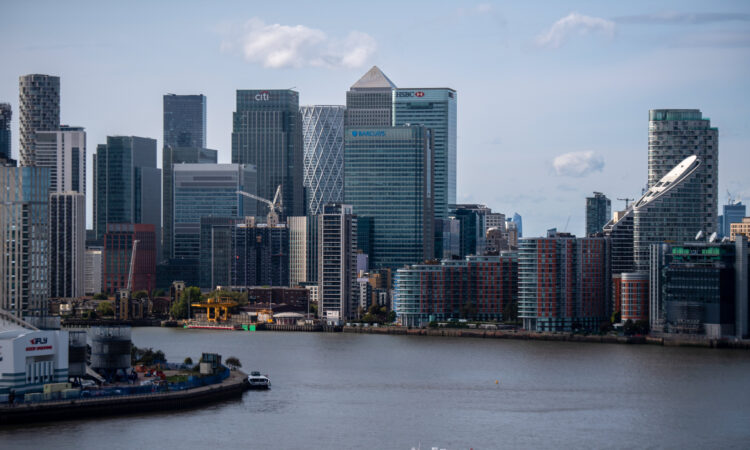
- At the party’s conference this week, lawmakers were unanimous in emphasizing Labour’s focus under leader Keir Starmer on spurring economic growth as its number one priority.
- Labour holds around a 20-point lead over Prime Minister Rishi Sunak’s Conservative Party across most major polling.
- The ruling party damaged by a string of scandals and the market turmoil triggered last year by Sunak’s predecessor Liz Truss’s disastrous “mini-budget.”
Skyscrapers in the Canary Wharf financial, business and shopping district in London, UK.
Bloomberg | Bloomberg | Getty Images
LIVERPOOL, England — The U.K.’s main opposition Labour party is seeking to woo London’s powerful financial center as it sets its sights on winning power at next year’s General Election.
At the party’s conference this week, lawmakers were unanimous in emphasizing Labour’s renewed focus under leader Keir Starmer on spurring economic growth as its number one priority.
Speaking at a fringe event on Sunday, Shadow Financial Secretary to the Treasury James Murray reiterated the party’s mission of achieving the highest growth in the G7 and engaging the private sector.
“Really, it’s front and center to what we want to see, our number one priority — talking about wealth creation, coming before wealth distribution, that’s a really important principle of the Labour party going into the next General Election — so that framing, I think, is really critical,” Murray said.
Labour holds around a 20-point lead over Prime Minister Rishi Sunak’s Conservative Party across most major polling, with the ruling party damaged by a string of scandals and the market turmoil triggered last year by Sunak’s predecessor Liz Truss’s disastrous “mini-budget.”
Murray took aim at Truss and former Chancellor Kwasi Kwarteng in setting out how Labour will seek to return “stability and certainty” to the country’s political system.
“Bringing that stability and certainty is no small thing. It really is crucial to underpin the encouragement of businesses to invest, to underpin everyone working together for economic growth,” Murray added.
“I think the second really crucial part of our approach is quite the emphasis that we put on how much we would work hand in hand with businesses, with the private sector, with private enterprise to get the economy growing.”
He said the shadow Treasury team sees the route to sustained economic growth as the state “creating the foundations for the private sector to bring the growth, to bring the innovation, to bring the competition, and to rebuild the wealth creation right across the economy.”
Shadow Chancellor Rachel Reeves announced a host of new economic pledges aimed at stimulating growth, vowing to “rebuild Britain” if Labour wins the 2024 General Election. In a confident speech to a packed exhibition hall in Liverpool, Reeves said Labour would fight the next election on the economy but said “change will only be achieved on the basis of iron discipline.”
This signaled a marked deviation from the party’s economic policy under former leader Jeremy Corbyn, which focused heavily on redistribution and was deeply unpopular with big business and London’s financial district.
Under Corbyn, Labour suffered its worst electoral result since 1935 in 2019, and Starmer has sought to drag the party back to the center in order to rebuild its core support in former heartlands.
Emma Reynolds, managing director of public affairs, policy and research at TheCityUK, a lobbying group for the U.K.’s financial and professional services sector, said the current shadow Treasury team had done an “excellent job of business engagement” and moved away from the prior leadership “which was seen by business, rightly or wrongly, as not encouraging of the private sector.”
“I think there is now more of a recognition that if we are going to, for example, deal with climate change, it can’t just be the state that is spending money. A lot of this investment has got to come from the private sector, the role of private finance is hugely important,” said Reynolds, a former Labour MP who will stand again at next year’s election.
“I think our industry stands ready to work with any government, obviously, — we’re not party political — but certainly if there was a Labour government, we like what we’re hearing in terms of working in partnership.”






